Mark those calendars for PMC 2025, returning to the Hilton in Universal City from October 7-9, 2025. More information coming soon, along with a special offering for all PMC 2024 attendees. We look forward to seeing you there next fall.
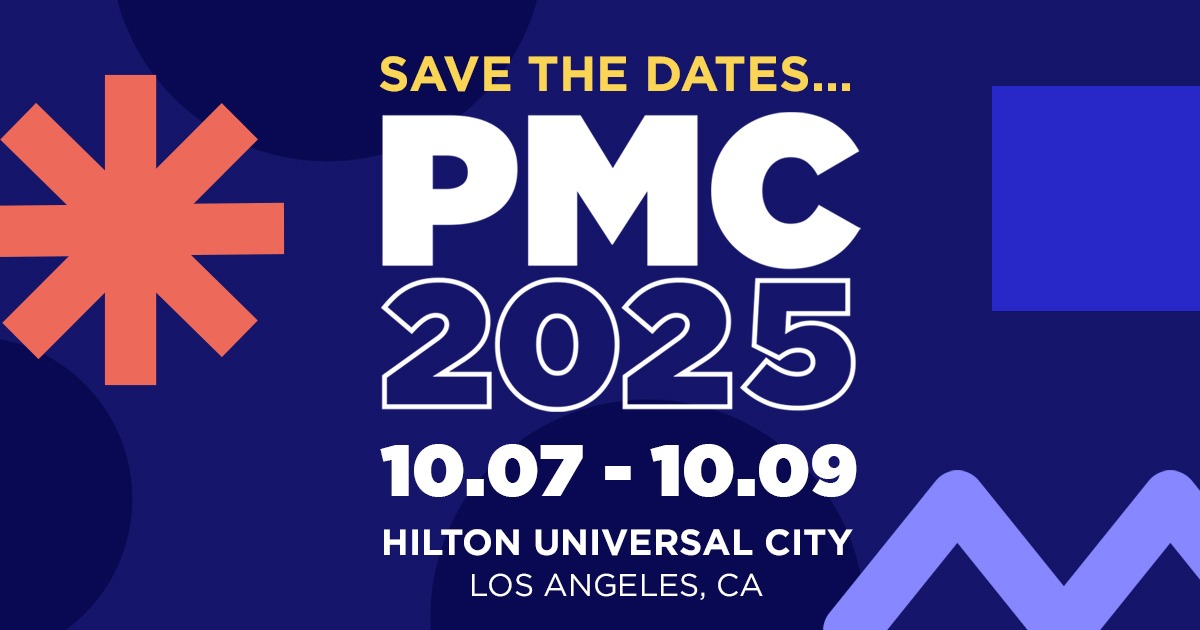

Mark those calendars for PMC 2025, returning to the Hilton in Universal City from October 7-9, 2025. More information coming soon, along with a special offering for all PMC 2024 attendees. We look forward to seeing you there next fall.

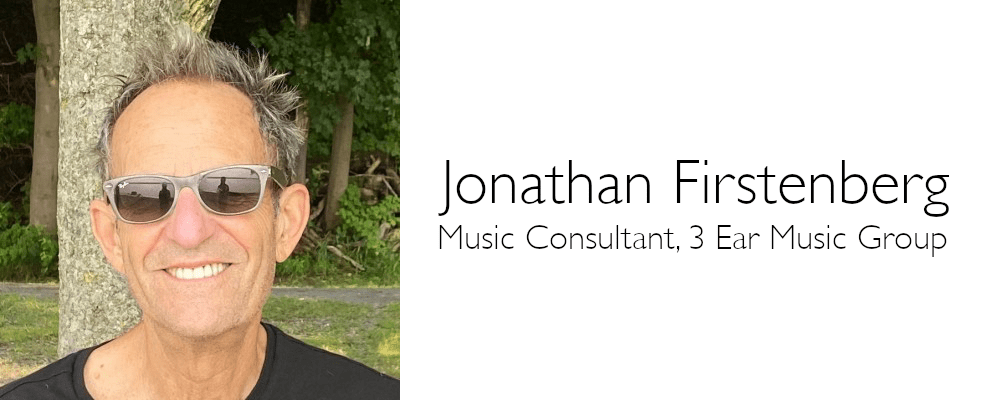
What Is Your Niche? While it’s important for a composer to be able to nail every bag, sometimes it’s more valuable to follow your specialization or niche. Is there a genre that you excel in both style and execution? Find your ultimate passion in composing, producing, and recording… then follow that lead.
Have you considered becoming a sub-publisher for both foreign composers and catalogs? This will expand the quantity of your cat as well as give you the ability to respond to briefs/searches/pitches you might otherwise have passed on. Why is quantity important? Most blanket agreements require a significant track count to balance the annual Blanket License fees. Caveat: these cats will expect you to grow their revenue. Perhaps you will need to add a music sales representative to gain their interest in working with and depending on you. A small advance could be offered as well.
What about creating videos, adding your music, and launching on YouTube? Ad revenue is a great icing revenue stream. For some, it’s more than icing. There are companies and investors out there investing in digital revenue only.
Are you with Sub Pubs in Foreign Territories? While this remains a standard strategy for U.S. cats seeking foreign exploitation, you might want to consider an Admin deal and arrangement instead. Some admins offer an advance. An Admin does not pitch your music…rather, it collects directly from their respective PROs at a much lower rate than a sub pub: 10-25% vs Sup Pub @ 50%. This might work for you if you are presently receiving PRO Foreign Income.
What industry reference guides are you depending on every day to expand your Network? There are several. You can learn of many online as digital/PDF copies are made available.
Are you attending Industry events? Attend as many Industry events as you can whether in person or online. Learn where to go and who to meet on the PMA site. What industry reference guides are you depending on every day to expand your Network? There are several. You can learn of many online as digital/PDF copies are made available.
Is your catalog celebrating an anniversary? A Big Win? A National spot? Placement in a new Film? Think new deals, acquisitions, clients, new office, new hires, and celebrating your ____th Anniversary. Perhaps this is the time to get some PR in the trades. Always be spreading your accomplishments and branding your brand.
Do you need an advance on your royalties? There are a few companies out there who understand the Quarterly Royalty Payment system and will advance you against future Royalties. There is usually interest to pay for this service. You can find these lenders online. You should also speak with your PRO about an advance.
Are you collecting Neighboring Rights? If not, go after them! There are some very experienced and generous NR collection Agencies out there. You have nothing to lose. You might also pair that pursuit with Sound Exchange.

Consider utilizing tools to help you in all aspects of growing your catalog and revenue at the same time. Do you know about Fuga? WIOpro? There are several other systems and platforms for delivering uncollected revenue to you.
Trust in your art and craft. Trust that you have created something larger than one composition. You’ve created an archive of music that will outlive you. Creating a Production Music Catalog, or a catalog of your works is one of the most worthy endeavors an artist/composer can pursue. Something brought you into this space…thrive in it!
This it what it takes to get into and stay in the Industry:
Perseverance – Ambition – Desire – Music Tools – Reference Guides – Commitment – Talent –
Luck
Consider a long-term license of a catalog that will expand your ability to respond to briefs. It could be Catalogs including Classical Music, Covers, Advertising, Trailer, SoundDesign, Well-known Masters, and other niches. Always be searching for new means to connect with existing and new licensees. Keep engaging to keep them engaged. Persistence!
Share a Licensing Rep with one or more other catalogs that are different from yours. A Rep can be your most vital and valuable asset.
Get your music into other PMLs or offer yourself as a WFH (work for hire) composer/producer. I know of catalog owners who not only write for themselves but also augment their income by composing for larger catalogs.
Create goals. Most composers/catalogs have a 5-year plan. Simply stated, “Where do you want to be in 5 years?” Think about your personal musical growth as well as projecting and tracking your income from sync, custom, and royalties. How many albums will you produce and add this
year? Are you growing for quantity or is the quality and stylistic approach and expansion into other genres the right path to pursue? Are you considering selling your assets or operation as a goal? Bottom line, what do you want to achieve? Is your revenue increasing or decreasing?
With either direction, your strategies should reflect your ongoing actions relating to catalog growth. There are no two music catalogs alike. Yours is in its own category regardless of what the Business Music claims. Treasure and feed it.
Have you thought about collaborating with other creatives? Composing is often a solo gig, but this is a great option for expanding your revenue-generating and creative model.
Spend some time on LinkedIn. You might also look into a Premium account as you can connect with industry leaders not accessible otherwise.
JF’s Rules of the Road:

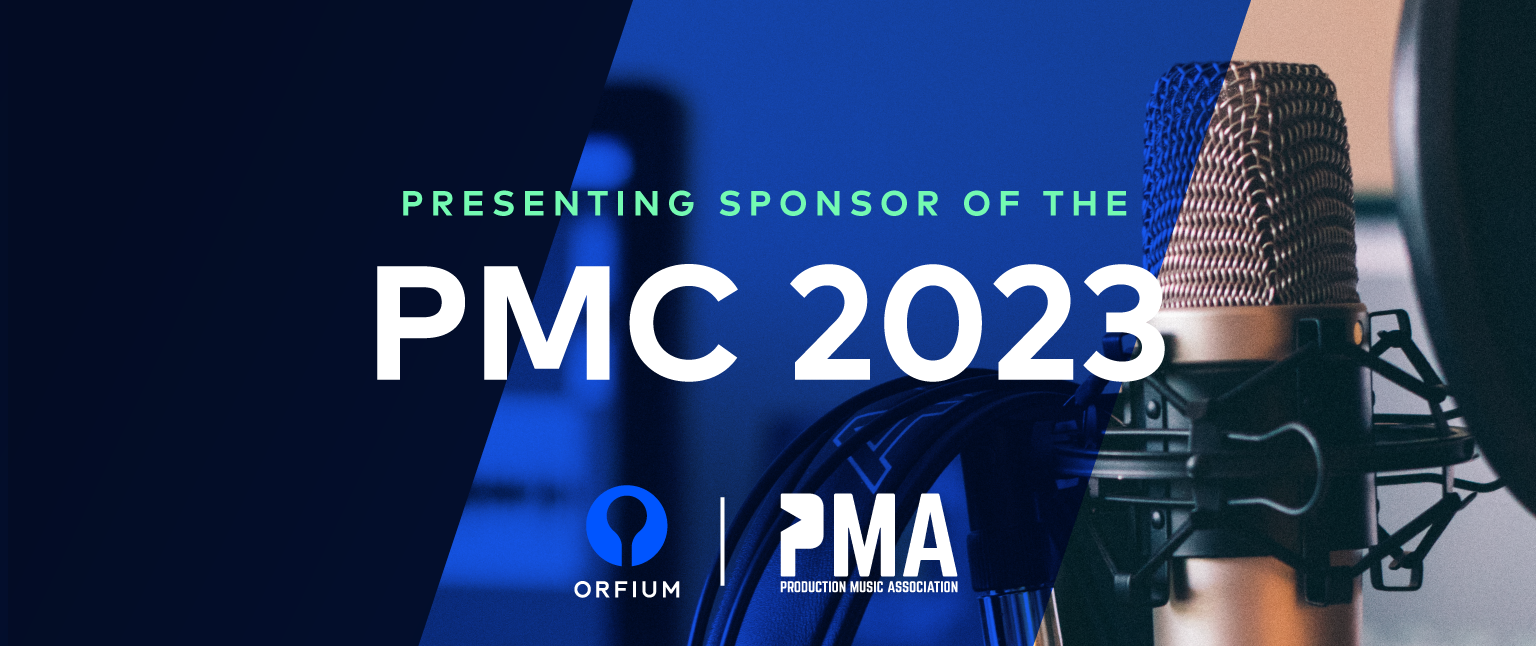
Los Angeles, CA — The Production Music Association is pleased to announce Orfium as the presenting sponsor of the 2023 Production Music Conference, to be held October 3-5, 2023 in Los Angeles, CA.
“It’s an honor to welcome Orfium back as our Production Music Conference presenting sponsor. The team at Orfium is fully committed to the production music industry, and have repeatedly demonstrated how powerful their licensing and cue sheet management software is,” says Morgan McKnight, Executive Director of the Production Music Association.
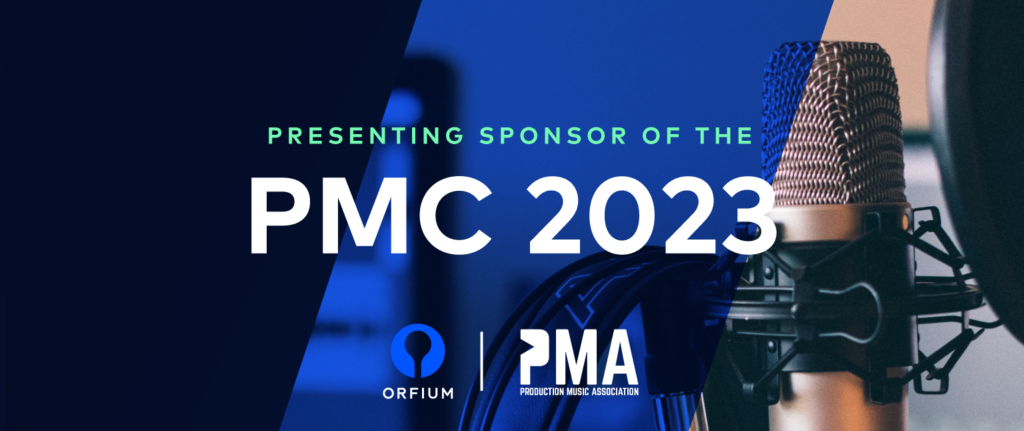
Orfium’s sponsorship of the PMC 2023 is a natural partnership; at the core of both is a vision of driving innovation within the Production Music industry.
Orfium’s suite of AI-powered technology enables Production Music Companies to:
“We’re thrilled to be the presenting sponsor of the 2023 Production Music Conference for the second year running,” says Francis Keeling, EVP Business Development at Orfium. “Our partnership with the Production Music Association is reflective of our shared commitment to driving innovation in Production Music through technology.”
Orfium will also join the Production Music Association community on Tuesday, September 19th from 10am-11am PT for a virtual meet & greet networking and presentation session. You can get more information and RSVP at www.pmamusic.com/events
To learn more about Orfium, and speak to their team, get in touch here.
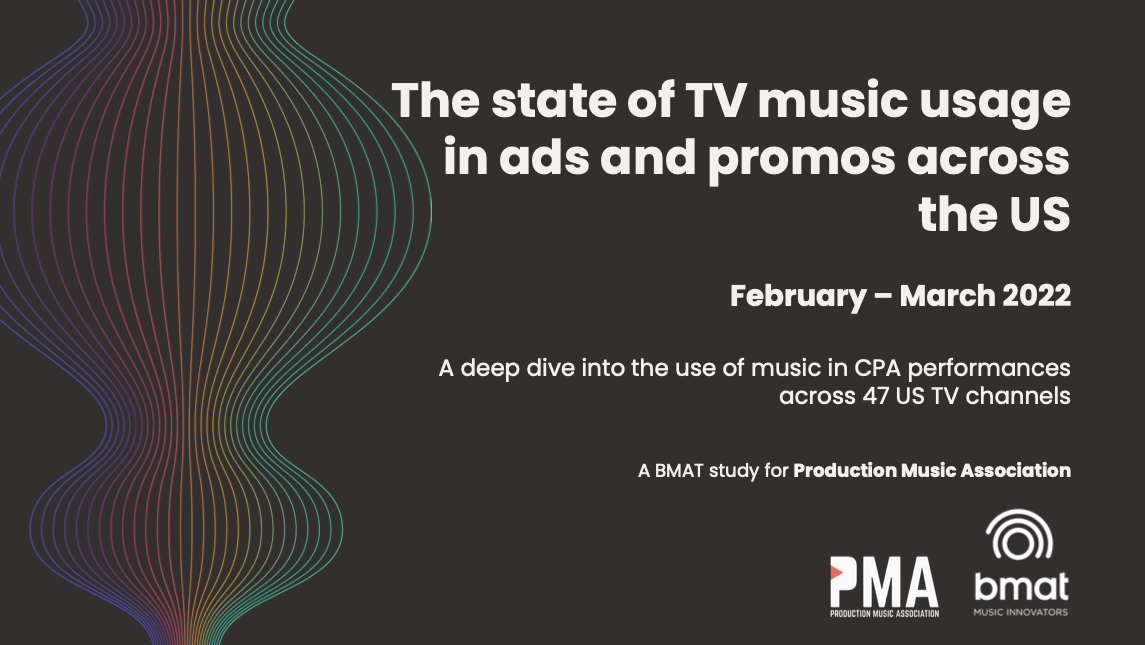
The state of TV music usage in ads and promos across the US – key findings:
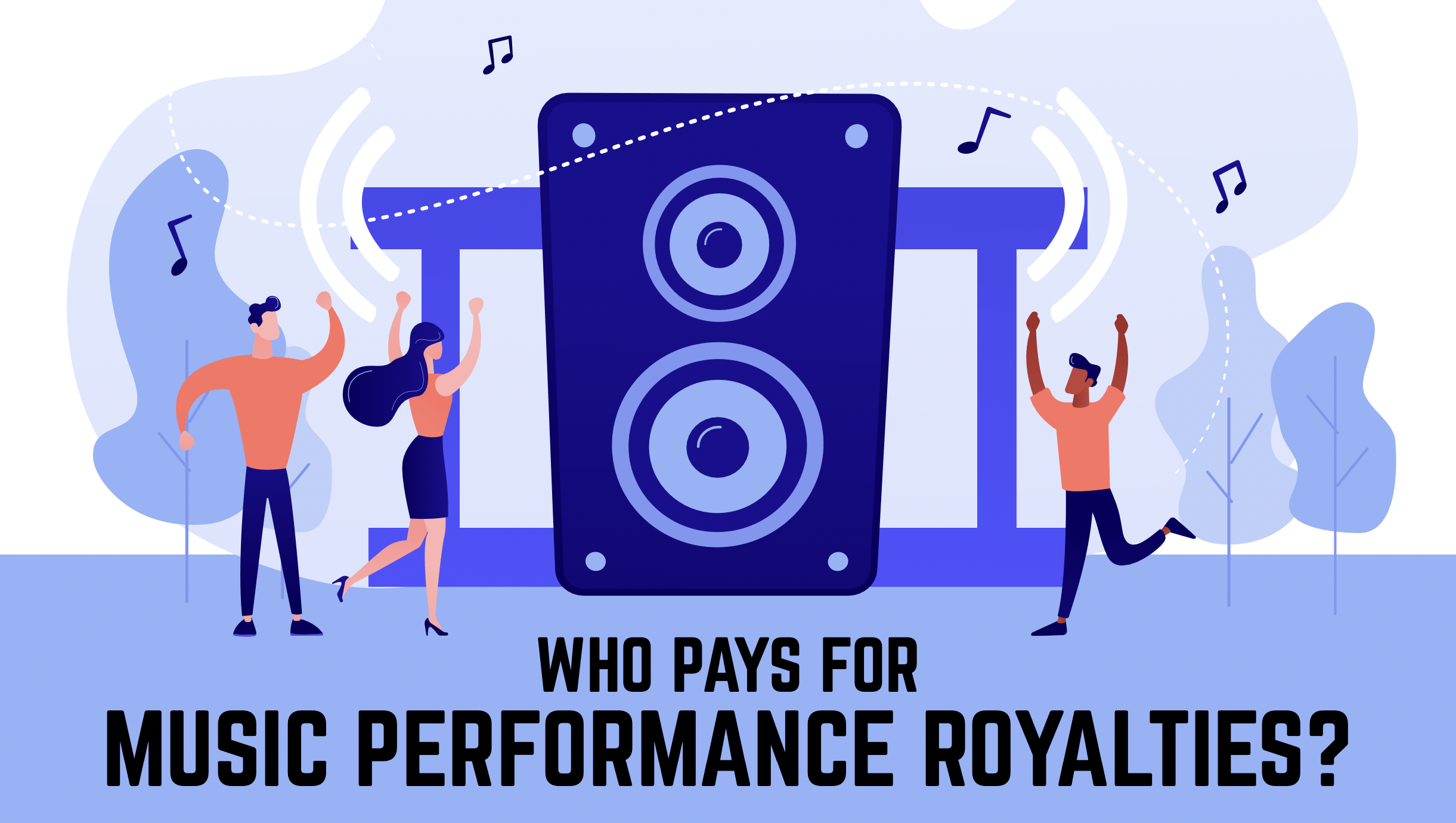
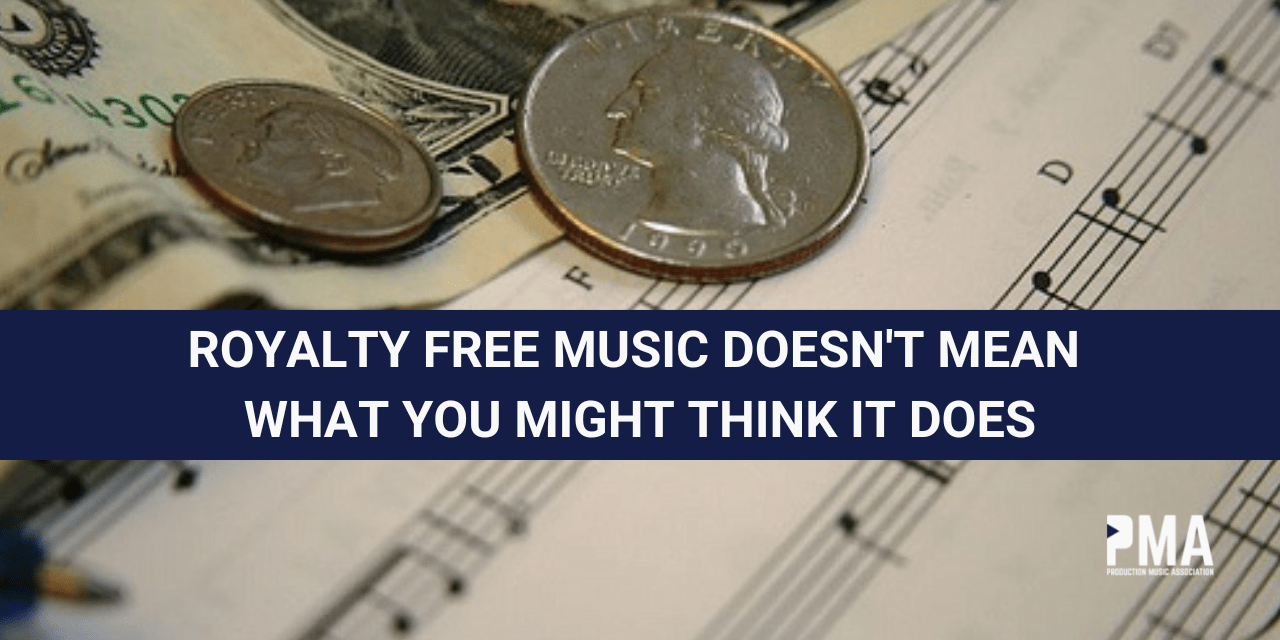
Many companies offer what they call ‘royalty-free’ music. But there are many misconceptions and incorrect assumptions around this phrase that do not match the legal reality. Read on to understand what using ‘royalty-free’ music does – and doesn’t – mean for users.
The most accurate definition of ‘royalty free’ is music that is licensed with a single fee and includes unlimited uses. However, contrary to common perception, most royalty-free music is not 100% free of any rights whatsoever.
A little history…..
“Royalty free” originally had nothing to do with music royalties at all. The term first started being used by stock photography and footage suppliers who offered media one of two ways:
– Rights Managed: content that must be licensed for each individual use
– Royalty Free: content that needed to be licensed only once with unlimited future usage.
Eventually, some stock photography/footage suppliers began offering production music and continued to use the term ‘royalty free’ to communicate the licensing method. The term was eventually adopted by many other music suppliers. This was an unfortunate migration of the term and creates a fair amount of confusion for content creators.
Common Misconceptions:
Content creators are not responsible for paying royalties to a PRO regardless if the music is royalty free or not. Exhibitors are responsible for securing the performing rights, and they are defined as anyone that plays music publicly, such as a streaming service, radio station, or concert venue. See infographic linked (and also below) for more on exhibitors and content creators.
This is often not the case. Many royalty free suppliers do not include proper indemnification or carry E&O insurance. There are additional concerns when the supplier is a crowd-sourced aggregator, such as copyright integrity and digital detection conflicts.
Not true. All musical works registered with a performing rights organization (PRO) pay out royalties when usage is properly reported.
Not true. The overwhelming majority of royalty free offerings are indeed registered with a PRO.
TL;DR. Always check the license and/or ask for clarification whenever a company claims its music is ‘royalty-free’.
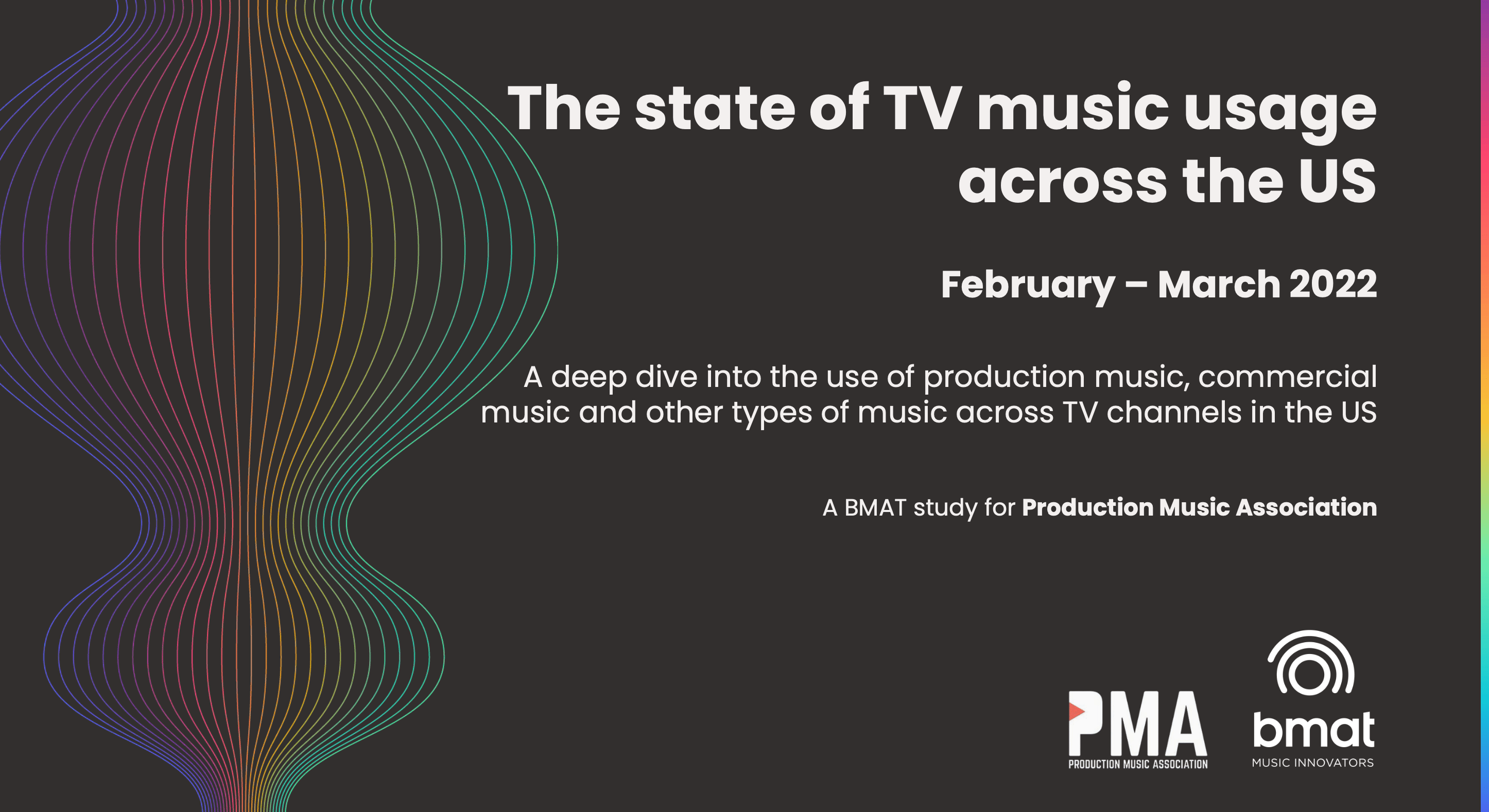
NEARLY HALF OF ALL MUSIC PLAYED ON BROADCAST & CABLE TV IN U.S. IS PRODUCTION MUSIC
Data Shows Production Music as the Dominant Source of Music for Media
Los Angeles, CA — A recent study by leading music data company BMAT Music Innovators found that more than 46% of all music played on top broadcast and cable television networks is production music identified by BMAT’s technology. The report, which looked at 47 high-rating TV channels identified by the Production Music Association over the period of February 11 – March 14, 2022, showed that production music was used 6.5 times more than commercial music on those networks during this period.
Additional findings identified that music is used in 39% of total air time on the selected U.S. channels, with the highest music usage occurring in lifestyle, documentary and reality TV channels. Unclassified music comprises 47% of music usage, which includes, but is not limited to, commissioned music, film and TV scores, catalogs owned by the broadcasters, as well as any production music libraries who do not have their music in the BMAT system at the time of the monitoring. Commercial music made up 7% of the music usage in the channels analyzed. The full report is below.
“The BMAT study indication that production music represents over 46% of the music used on key networks is in itself a powerful demonstration of the value and importance of production music to the television and advertising industries,” says Adam Taylor, President of APM Music and Chairman of the Production Music Association. “It is also important to note that if all libraries were in the BMAT system, this percentage would be far higher. Production music is specifically written in service of the moving image, and it is clear that our music plays a vital role in the success of modern programming.”
“The findings of this survey validate that production music is the dominant source of music on broadcast and cable TV, making up almost half of all music usage. We are thrilled to see these results, and this study firmly establishes our industry as an integral part of the media landscape, while confirming what we’ve known intuitively for years,” says Production Music Association Executive Director, Morgan McKnight.
“This is a highly competitive market, with all the major labels and countless independents vying for market share. As a result, the creative level of libraries has risen dramatically over the last decade, becoming just one of the reasons why so many of the world’s most successful companies choose production music every day,” said Joe Saba, Co-Founder of VideoHelper and Vice Chairman of the Production Music Association. “On the tech side, production music has led the way in many areas, including YouTube monetization, music search, digital music detection, and even AI-based music categorization.”
“BMAT helps individual production music libraries to drive their business and get paid what they deserve. In this case, we made available our capabilities to the Production Music Association, going one step further to support the production music community. Our extensive music database mixed with our in-house developed audio fingerprinting technology and thorough data analysis experience were key to demonstrating something that many of us presumed – the importance of production music on TV and its massive contribution to at-home entertainment,” said Luis Ruano, VP of Rights Admin at BMAT.
As the library business continues to stay at the forefront of creativity and technology, this annual report will track production music usage year over year. With the constant adaptation and development of this industry, the Production Music Association expects production music usage to increase each year. The Production Music Association continues to fight and advocate for fair payouts and accurate reporting for the community.
ABOUT PRODUCTION MUSIC
Production music is heard everywhere – in major motion pictures, on streaming platforms, in major league sporting events, and is pretty much everywhere on the internet.
Production music is what used to be known as ‘stock music’. It is different from traditional “commercial”music in that it is specifically composed for use in media productions, typically as part of a catalog of music made available for immediate licensing and where the publisher and recording owner are the same entity.
ABOUT THE PRODUCTION MUSIC ASSOCIATION
The Production Music Association (PMA) is the leading advocate and voice of the production music community. We are dedicated to advancing the unique value of production music and working together to ensure a better future for our community.
We are a non-profit organization counting over 670 music publisher and composer members. Major labels, independent boutiques, emerging composers and well-known Grammy™ winners are all part of our membership. Together, our members account for over 2,000,000 individual copyrights. PMA music is heard daily in every country around the world.
Our goal is to provide to all our members the education, support and advocacy needed to support their careers and enhance the value of their craft.
The PMA hosts the annual Production Music Conference in Los Angeles, which has become the global gathering place for the industry.
ABOUT BMAT MUSIC INNOVATORS
BMAT is a music innovation company with a mission to index all music usage and ownership data. They help all different companies in the music industry better their data operations to make sure artists get paid for their plays. Every day BMAT delivers 27 billion matches and 80 million identifications to CMOs, publishers, record labels, broadcasters and DSPs globally.
Every day, BMAT monitors over 7000 radio and TV channels, matching against their database of 92 million unique audio fingerprints. BMAT tracks and processes over 168,000 hours of music on radio and TV, and processes music usage reports from +80 DSPs, generating up to 27 billion music matches per day., music longer than 2 seconds with 99.9% accuracy in clean audio environment, and with 93% in distorted environments.
Driven by machine learning and copyright expertise, BMAT’s Music Operating System pumps neutral data and authoritative knowledge to everyone along the chain. Everyone who makes or uses music can plug in to ease operations, increase earnings, and get in sync with everyone else.
More about BMAT at https://www.bmat.com/
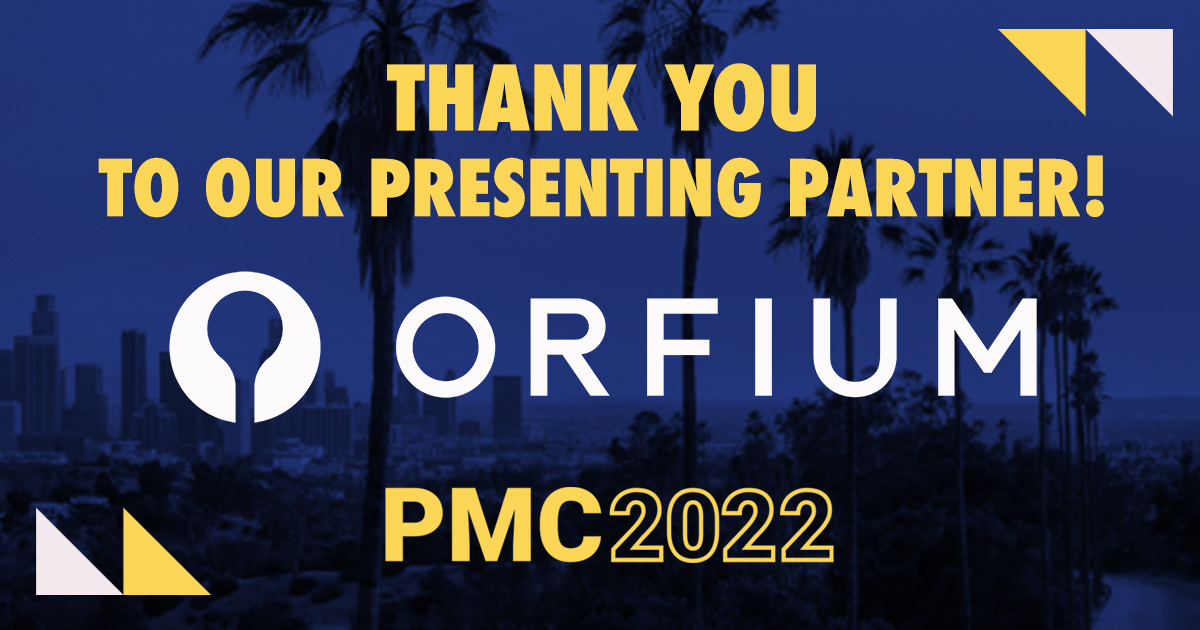
Los Angeles, CA — The Production Music Association is pleased to announce ORFIUM as the presenting sponsor of the 2022 Production Music Conference, to be held September 21-23, 2022 in Los Angeles, CA.
“ORFIUM’s dedication to helping music creators protect and monetize their work on UGC platforms is incredibly important as the need for effective digital licensing grows” said Morgan McKnight, Executive Director of the Production Music Association. “We’re thrilled they will be joining us as the PMC presenting sponsor for 2022.”
ORFIUM offers the most powerful automated license clearance software on the market – Synctracker – ensuring your customer’s licensed music use won’t get claimed, while capturing all revenue from unlicensed usage of your music. UGC platforms lack a mechanism to proactively clear licensed use of music on a video-by-video basis. Most companies address this problem by either not monetizing UGC content or by whitelisting entire channels. ORFIUM is solving this problem with Synctracker.
Synctracker is the only solution that programmatically checks each video for licensed music usage before a claim is placed. It is able to distinguish between licensed and unlicensed usage of music, allowing rights owners to monetize true UGC. The API provides for seamless integration with both UGC platforms and your website, managed web application or CRM.
“Sync licensing is seeing huge growth across the UGC, Digital, TV and Film space, with creators desperate to find legitimate ways of licensing the best music catalogues. We are delighted to be working with the Production Music Association and its partners on what should be an incredible conference,” said Francis Keeling, Executive Vice President of Business Development at ORFIUM.
ORFIUM will also join the Production Music Association community on Tuesday, August 23rd from 10am-11am PT for a virtual meet & greet networking and presentation session. You can get more information and RSVP at www.pmamusic.com/events
Anyone interested in a demo with ORFIUM can reach out and schedule with Bryan Bakke – bryan.bakke@orfium.com or place a time on the calendar here.
Megatrax – Remote
High growth sales opportunity licensing music for corporate/enterprise clients. Join a great team at an established, reputable, innovative production music company pitching music, developing new business and seeking out new licensing opportunities. Salary plus commission and benefits, work from home. Must have 5+ years outside sales and account management experience with a proven track record of new business development and sales success. Music or media production industry experience preferred.
Contact: humanresources@megatrax.com
Megatrax – East Coast
High growth sales opportunity licensing music for advertising, brands and film/TV/video productions. Join a great team at an established, reputable, innovative production music company pitching music, developing new business and seeking out new licensing opportunities. Salary plus commission and benefits, work from home. Must have prior experience in sync licensing and music pitching for advertising and brands, and a successful track record in sales and business development. East Coast-based candidates preferred.
Contact: humanresources@megatrax.com